


|
http://www.777seo.com/seo.php?username=wahyudewi&format=ptp
|
|---|
|
|---|
















Peugeot 308 RC-Z concept was introduced at the Frankfurt show back in 2007 and it will be mass produced by May 2010. This cool car is a front-wheel drive vehicle equipped with a Mini Cooper JCW 1.6 turbo unit that able to provide 218bhp. The concept and the mass produced car has a slight differences in the headlight design and the exterior body curve.
The interior of this unique car has a sophisticated design and a polycarbonate roof with twin bubbles to increase headroom. The cockpit is trimmed in leather, chrome, aluminum and black-lacquered plastic.
This Peugeot concept car power is provided by the same 1.6-litre 163kW/218hp direct injection four cylinder that can be found in the Mini Cooper. Peugeot 308 RC-Z is relatively lightweight and should be capable of decent turn of speed.
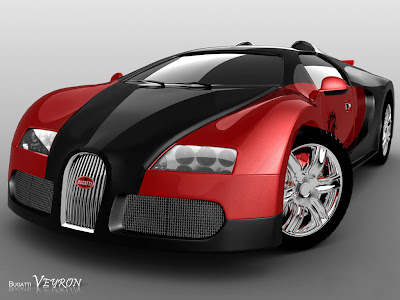 The transmission in the vehicle consists of Direct Shift gearbox with dual clutches, manual gearbox controlled by the computer with the 7 gear ratios, magnesium paddles next to the steering wheel and has the shift time of 150 Ms. The vehicle uses the Haldex traction system and provides the 4-wheel drive. The new Veyron uses the flat tires from the Michelin, which are specially designed for the Veyron to provide the maximum speed. The curb weight of the vehicle will be 2034 kilo grams.
The transmission in the vehicle consists of Direct Shift gearbox with dual clutches, manual gearbox controlled by the computer with the 7 gear ratios, magnesium paddles next to the steering wheel and has the shift time of 150 Ms. The vehicle uses the Haldex traction system and provides the 4-wheel drive. The new Veyron uses the flat tires from the Michelin, which are specially designed for the Veyron to provide the maximum speed. The curb weight of the vehicle will be 2034 kilo grams.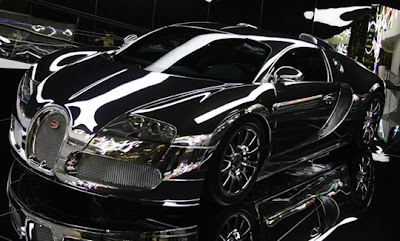 The wheel base of the Veyron is about 2710 mm, while the length, width and the height of the model are 4462 mm, 1998 mm and 1204 mm respectively. The Bugatti Veyron modification has 10 radiators in total - 1 hydraulic oil radiator for the spoiler, 3 radiators for the engine cooling system, 1 engine oil radiator, 1 heat exchanger for the air-to-liquid intercoolers, 1 differential oil radiator, 2 for the air conditioning system and 1 transmission oil radiator.
The wheel base of the Veyron is about 2710 mm, while the length, width and the height of the model are 4462 mm, 1998 mm and 1204 mm respectively. The Bugatti Veyron modification has 10 radiators in total - 1 hydraulic oil radiator for the spoiler, 3 radiators for the engine cooling system, 1 engine oil radiator, 1 heat exchanger for the air-to-liquid intercoolers, 1 differential oil radiator, 2 for the air conditioning system and 1 transmission oil radiator.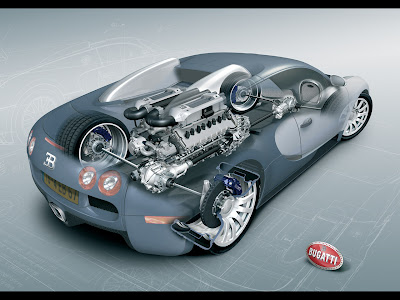 The engine in the vehicle produces 746 kilo watts of power and a massive 920 lb ft of torque. The maximum speed of the vehicle is about 400 kilo meters per hour, and the most fascinating part of the story is that the new Bugatti Veyron is capable of reaching the speed of 200 kilo meters per hour in just 7.3 seconds.
The engine in the vehicle produces 746 kilo watts of power and a massive 920 lb ft of torque. The maximum speed of the vehicle is about 400 kilo meters per hour, and the most fascinating part of the story is that the new Bugatti Veyron is capable of reaching the speed of 200 kilo meters per hour in just 7.3 seconds.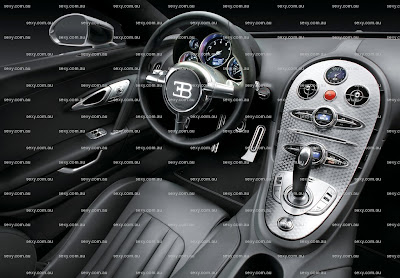
 The transmission in the vehicle consists of Direct Shift gearbox with dual clutches, manual gearbox controlled by the computer with the 7 gear ratios, magnesium paddles next to the steering wheel and has the shift time of 150 Ms. The vehicle uses the Haldex traction system and provides the 4-wheel drive. The new Veyron uses the flat tires from the Michelin, which are specially designed for the Veyron to provide the maximum speed. The curb weight of the vehicle will be 2034 kilo grams.
The transmission in the vehicle consists of Direct Shift gearbox with dual clutches, manual gearbox controlled by the computer with the 7 gear ratios, magnesium paddles next to the steering wheel and has the shift time of 150 Ms. The vehicle uses the Haldex traction system and provides the 4-wheel drive. The new Veyron uses the flat tires from the Michelin, which are specially designed for the Veyron to provide the maximum speed. The curb weight of the vehicle will be 2034 kilo grams. The wheel base of the Veyron is about 2710 mm, while the length, width and the height of the model are 4462 mm, 1998 mm and 1204 mm respectively. The Bugatti Veyron modification has 10 radiators in total - 1 hydraulic oil radiator for the spoiler, 3 radiators for the engine cooling system, 1 engine oil radiator, 1 heat exchanger for the air-to-liquid intercoolers, 1 differential oil radiator, 2 for the air conditioning system and 1 transmission oil radiator.
The wheel base of the Veyron is about 2710 mm, while the length, width and the height of the model are 4462 mm, 1998 mm and 1204 mm respectively. The Bugatti Veyron modification has 10 radiators in total - 1 hydraulic oil radiator for the spoiler, 3 radiators for the engine cooling system, 1 engine oil radiator, 1 heat exchanger for the air-to-liquid intercoolers, 1 differential oil radiator, 2 for the air conditioning system and 1 transmission oil radiator. The engine in the vehicle produces 746 kilo watts of power and a massive 920 lb ft of torque. The maximum speed of the vehicle is about 400 kilo meters per hour, and the most fascinating part of the story is that the new Bugatti Veyron is capable of reaching the speed of 200 kilo meters per hour in just 7.3 seconds.
The engine in the vehicle produces 746 kilo watts of power and a massive 920 lb ft of torque. The maximum speed of the vehicle is about 400 kilo meters per hour, and the most fascinating part of the story is that the new Bugatti Veyron is capable of reaching the speed of 200 kilo meters per hour in just 7.3 seconds.

 Oh, and there's one more thing: Nissan has given the GT-R new Transmission Control Module programming. The new code is said to increase durability and drop acceleration times with the Vehicle Dynamic Control activated. It should also put an end to concerns about damaging the transmission by using the vehicle's Launch Control with VDC turned off. Preliminary reports indicate that the 2010 GT-R is still faster than all get out with the new programming.
Oh, and there's one more thing: Nissan has given the GT-R new Transmission Control Module programming. The new code is said to increase durability and drop acceleration times with the Vehicle Dynamic Control activated. It should also put an end to concerns about damaging the transmission by using the vehicle's Launch Control with VDC turned off. Preliminary reports indicate that the 2010 GT-R is still faster than all get out with the new programming. For 2010, the horsepower rating of the GT-R's 3.8-liter twin-turbo V6 engine has increased to 485 hp (from 480 hp) and the car's high-performance, 6-speed, dual-clutch transmission receives new Transmission Control Module (TCM) programming designed to optimize clutch engagement for improved drivability, and improve vehicle acceleration with the Vehicle Dynamic Control (VDC) on (activated). In addition, the braking system has been updated with more rigid brake lines for improved durability, and the brake calipers now carry both the Brembo and Nissan logos. Finally, the GT-R's state-of-the-art suspension has been retuned with redesigned Bilsteinâ shocks with a new valve body design and revised spring and damper rates.
For 2010, the horsepower rating of the GT-R's 3.8-liter twin-turbo V6 engine has increased to 485 hp (from 480 hp) and the car's high-performance, 6-speed, dual-clutch transmission receives new Transmission Control Module (TCM) programming designed to optimize clutch engagement for improved drivability, and improve vehicle acceleration with the Vehicle Dynamic Control (VDC) on (activated). In addition, the braking system has been updated with more rigid brake lines for improved durability, and the brake calipers now carry both the Brembo and Nissan logos. Finally, the GT-R's state-of-the-art suspension has been retuned with redesigned Bilsteinâ shocks with a new valve body design and revised spring and damper rates.
 Oh, and there's one more thing: Nissan has given the GT-R new Transmission Control Module programming. The new code is said to increase durability and drop acceleration times with the Vehicle Dynamic Control activated. It should also put an end to concerns about damaging the transmission by using the vehicle's Launch Control with VDC turned off. Preliminary reports indicate that the 2010 GT-R is still faster than all get out with the new programming.
Oh, and there's one more thing: Nissan has given the GT-R new Transmission Control Module programming. The new code is said to increase durability and drop acceleration times with the Vehicle Dynamic Control activated. It should also put an end to concerns about damaging the transmission by using the vehicle's Launch Control with VDC turned off. Preliminary reports indicate that the 2010 GT-R is still faster than all get out with the new programming. For 2010, the horsepower rating of the GT-R's 3.8-liter twin-turbo V6 engine has increased to 485 hp (from 480 hp) and the car's high-performance, 6-speed, dual-clutch transmission receives new Transmission Control Module (TCM) programming designed to optimize clutch engagement for improved drivability, and improve vehicle acceleration with the Vehicle Dynamic Control (VDC) on (activated). In addition, the braking system has been updated with more rigid brake lines for improved durability, and the brake calipers now carry both the Brembo and Nissan logos. Finally, the GT-R's state-of-the-art suspension has been retuned with redesigned Bilsteinâ shocks with a new valve body design and revised spring and damper rates.
For 2010, the horsepower rating of the GT-R's 3.8-liter twin-turbo V6 engine has increased to 485 hp (from 480 hp) and the car's high-performance, 6-speed, dual-clutch transmission receives new Transmission Control Module (TCM) programming designed to optimize clutch engagement for improved drivability, and improve vehicle acceleration with the Vehicle Dynamic Control (VDC) on (activated). In addition, the braking system has been updated with more rigid brake lines for improved durability, and the brake calipers now carry both the Brembo and Nissan logos. Finally, the GT-R's state-of-the-art suspension has been retuned with redesigned Bilsteinâ shocks with a new valve body design and revised spring and damper rates. Being an automotive journalist is like being a male porn star. We're little more than Piloti-shoed buffers between the reader and the objects of their lust, and really, no one cares about us. Still, you only get one chance to make an initial impression, so my first review here on Autoblog had to be big. As luck/fate would have it, I got a phone call a few weeks back that went a little something like this: "How'd you like to drive the first 2010 Nissan GTR on the West Coast, before the buff books get it?" Needless to say, the answer was obvious. But what to do with the brand-new R35, one of the most heavily and relentlessly covered car-stories of the past year? This takes us right back to that porno metaphor: How do I give the people what they want?
Being an automotive journalist is like being a male porn star. We're little more than Piloti-shoed buffers between the reader and the objects of their lust, and really, no one cares about us. Still, you only get one chance to make an initial impression, so my first review here on Autoblog had to be big. As luck/fate would have it, I got a phone call a few weeks back that went a little something like this: "How'd you like to drive the first 2010 Nissan GTR on the West Coast, before the buff books get it?" Needless to say, the answer was obvious. But what to do with the brand-new R35, one of the most heavily and relentlessly covered car-stories of the past year? This takes us right back to that porno metaphor: How do I give the people what they want?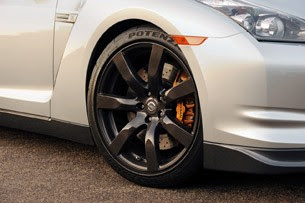 We hatched a plan – take the uber-Nissan down to San Diego and pay a visit to Comic Con! A story about 400-pound guys in Batman suits drooling all over the new GT-R practically writes itself, so we contacted various video game companies to see if they would let us drive the GT-R right onto the convention center floor. Perfect! Our stunt would be like lowering a nude, greased-up Megan Fox into a frat house. What could possibly go wrong? Without getting into the epic fail of that last bit, it didn't happen. What you're left with then is yet another review of a Nissan GTR 2010 Modification where some "pounding at 11/10s" wannabe hamfists Godzilla through envy-inducing, tight, twisty Southern California canyons. Lucky you... err, me.
We hatched a plan – take the uber-Nissan down to San Diego and pay a visit to Comic Con! A story about 400-pound guys in Batman suits drooling all over the new GT-R practically writes itself, so we contacted various video game companies to see if they would let us drive the GT-R right onto the convention center floor. Perfect! Our stunt would be like lowering a nude, greased-up Megan Fox into a frat house. What could possibly go wrong? Without getting into the epic fail of that last bit, it didn't happen. What you're left with then is yet another review of a Nissan GTR 2010 Modification where some "pounding at 11/10s" wannabe hamfists Godzilla through envy-inducing, tight, twisty Southern California canyons. Lucky you... err, me. My task then would be to answer the following: There's endless talk about whether or not the Nissan GT-R 2010 modif has a soul. Yes, we all know it's supercar quick and hypercar capable. And yes, Japan's most recent foray into the segment can utterly dominate and humiliate most British, Italian and German machines – all costing two, three or five times as much – and give like-minded American all-stars a run for their ACR/ZR1 money. But is the GT-R anything more than a numb supercomputer, mindlessly parsing bits of data and then spitting out traction and velocity? Are its capabilities a credit to Nissan's mechanical engineers, or its electrical wonks? To put it another, more Comic-Conny way, is there a ghost in Nissan's machine?
My task then would be to answer the following: There's endless talk about whether or not the Nissan GT-R 2010 modif has a soul. Yes, we all know it's supercar quick and hypercar capable. And yes, Japan's most recent foray into the segment can utterly dominate and humiliate most British, Italian and German machines – all costing two, three or five times as much – and give like-minded American all-stars a run for their ACR/ZR1 money. But is the GT-R anything more than a numb supercomputer, mindlessly parsing bits of data and then spitting out traction and velocity? Are its capabilities a credit to Nissan's mechanical engineers, or its electrical wonks? To put it another, more Comic-Conny way, is there a ghost in Nissan's machine?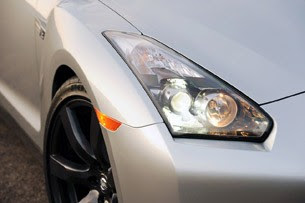 The big news is bye-bye launch control.
The big news is bye-bye launch control. That said, the Transmission Control Module (TCM) has been reprogrammed. Not only can the six-speed dual-clutch gearbox shift faster (when in R), but the chances of a customer having to shell out $20,000 for a new cogswapper is greatly reduced. The 2010 GT-R also sports five more horsepower, bringing the total to 485, while torque output remains unchanged at 434 lb-ft. Rumors still persist that since each GT-R engine is hand-built, power levels vary and some engines churn out as much as 520 hp, if not more. Let's chalk this up to some engines running 100 octane and others dealing with California's crapola 91 high-test. Bottom line, the power feels freakishly adequate.
That said, the Transmission Control Module (TCM) has been reprogrammed. Not only can the six-speed dual-clutch gearbox shift faster (when in R), but the chances of a customer having to shell out $20,000 for a new cogswapper is greatly reduced. The 2010 GT-R also sports five more horsepower, bringing the total to 485, while torque output remains unchanged at 434 lb-ft. Rumors still persist that since each GT-R engine is hand-built, power levels vary and some engines churn out as much as 520 hp, if not more. Let's chalk this up to some engines running 100 octane and others dealing with California's crapola 91 high-test. Bottom line, the power feels freakishly adequate. The suspension's been retuned and the Bilsteins are a new design, while the brakes (somehow) have been revamped and fitted with more rigid lines and fresh pads. Our Premium GT-R tester arrived with dark, "near-black" wheels and when coated in Super Silver (like this car) you get a polished front bumper (there's also a new hue called Pearl White). More power, faster shifts, better handling, stouter brakes, blacker wheels and a transmission that's much less likely to eat itself? That sounds fantastic. Soulful, even.
The suspension's been retuned and the Bilsteins are a new design, while the brakes (somehow) have been revamped and fitted with more rigid lines and fresh pads. Our Premium GT-R tester arrived with dark, "near-black" wheels and when coated in Super Silver (like this car) you get a polished front bumper (there's also a new hue called Pearl White). More power, faster shifts, better handling, stouter brakes, blacker wheels and a transmission that's much less likely to eat itself? That sounds fantastic. Soulful, even. Well, maybe a little about the back seat. No joke: You cannot fit your hand between the front and rear thrones. Even children would be miserable. As far as the front of the cockpit goes, for a Nissan, it's pretty much okay. For an $86,000 vehicle, it's not nearly as nice as you'd like. Sure, there's leather all over the doors and on part of the dash, but it's budget, cheap-feeling leather, not that opulent, veal-fat rubbed and pleated cowhide you'd find in a Spyker. However, all that really matters is the usable stuff. The pedals, steering wheel, flappy-paddles, seats and handbrake are all up to supercar snuff. Especially that burly handbrake.
Well, maybe a little about the back seat. No joke: You cannot fit your hand between the front and rear thrones. Even children would be miserable. As far as the front of the cockpit goes, for a Nissan, it's pretty much okay. For an $86,000 vehicle, it's not nearly as nice as you'd like. Sure, there's leather all over the doors and on part of the dash, but it's budget, cheap-feeling leather, not that opulent, veal-fat rubbed and pleated cowhide you'd find in a Spyker. However, all that really matters is the usable stuff. The pedals, steering wheel, flappy-paddles, seats and handbrake are all up to supercar snuff. Especially that burly handbrake. Yeah, yeah, yeah -- 485 hp cars with 434 lb-ft of torque and AWD traction should be blisteringly fast when pointed straight. But the GT-R weighs over 3,800 pounds. Can the near two-ton porkster mechanically handle the twisty stuff? Simply put: Yes. But 'handles' is not even the right word. Dispatch, conquer, dominate, tear asunder, murder – that's it – the GT-R murders corners dead. Starting with the donk-sized tires (255/40 R20 in front, 285/35 R20 out back), moving to the retuned suspension and ending with the innards of a Swiss watch-fancy AWD system, the GT-R has world-class Stickum.
Yeah, yeah, yeah -- 485 hp cars with 434 lb-ft of torque and AWD traction should be blisteringly fast when pointed straight. But the GT-R weighs over 3,800 pounds. Can the near two-ton porkster mechanically handle the twisty stuff? Simply put: Yes. But 'handles' is not even the right word. Dispatch, conquer, dominate, tear asunder, murder – that's it – the GT-R murders corners dead. Starting with the donk-sized tires (255/40 R20 in front, 285/35 R20 out back), moving to the retuned suspension and ending with the innards of a Swiss watch-fancy AWD system, the GT-R has world-class Stickum. Did I mention the stoppers? Going by the ancient caveat, "A car's only as good as its brakes," the new GT-R is the third best car in the world. Period. Cymbal-sized 15-inch discs at all four corners and six-piston Nissan-branded Brembo calipers join forces to mess with the space/time continuum. Slowing the car from 60 mph is near effortless. When you dip deeper into the near-bottomless well of power -- say around 140 mph – the brakes still work flabbergastingly well, hauling you down to something resembling a speed limit in mere moments. At one point in downtown L.A, a school bus cut us off and neither driver nor passenger were the least bit worried. Why? We'd been using the brakes all day – we knew.
Did I mention the stoppers? Going by the ancient caveat, "A car's only as good as its brakes," the new GT-R is the third best car in the world. Period. Cymbal-sized 15-inch discs at all four corners and six-piston Nissan-branded Brembo calipers join forces to mess with the space/time continuum. Slowing the car from 60 mph is near effortless. When you dip deeper into the near-bottomless well of power -- say around 140 mph – the brakes still work flabbergastingly well, hauling you down to something resembling a speed limit in mere moments. At one point in downtown L.A, a school bus cut us off and neither driver nor passenger were the least bit worried. Why? We'd been using the brakes all day – we knew. So what's up then? Why the bum rap? Why do so many journalists (and I can't name names because I'm friends with so many of them) write off the GT-R as highly competent but ultimately soulless? Sure, it's one of the four or five most mindboggling performance vehicles on sale, but... meh. They just don't dig it. Besides not driving it hard enough, here's another explanation: Remember when compact discs came out? There was a seemingly endless series of interviews on MTV with guys like Tom Petty bemoaning the loss of the pops, hisses and scratches inherent to records. The flaws were part of the sound, man. You can't flip a CD over – how do you know what side of the record is playing? That's fine, but it's just knee-jerk reactionary nostalgia.
So what's up then? Why the bum rap? Why do so many journalists (and I can't name names because I'm friends with so many of them) write off the GT-R as highly competent but ultimately soulless? Sure, it's one of the four or five most mindboggling performance vehicles on sale, but... meh. They just don't dig it. Besides not driving it hard enough, here's another explanation: Remember when compact discs came out? There was a seemingly endless series of interviews on MTV with guys like Tom Petty bemoaning the loss of the pops, hisses and scratches inherent to records. The flaws were part of the sound, man. You can't flip a CD over – how do you know what side of the record is playing? That's fine, but it's just knee-jerk reactionary nostalgia. Being an automotive journalist is like being a male porn star. We're little more than Piloti-shoed buffers between the reader and the objects of their lust, and really, no one cares about us. Still, you only get one chance to make an initial impression, so my first review here on Autoblog had to be big. As luck/fate would have it, I got a phone call a few weeks back that went a little something like this: "How'd you like to drive the first 2010 Nissan GTR on the West Coast, before the buff books get it?" Needless to say, the answer was obvious. But what to do with the brand-new R35, one of the most heavily and relentlessly covered car-stories of the past year? This takes us right back to that porno metaphor: How do I give the people what they want?
Being an automotive journalist is like being a male porn star. We're little more than Piloti-shoed buffers between the reader and the objects of their lust, and really, no one cares about us. Still, you only get one chance to make an initial impression, so my first review here on Autoblog had to be big. As luck/fate would have it, I got a phone call a few weeks back that went a little something like this: "How'd you like to drive the first 2010 Nissan GTR on the West Coast, before the buff books get it?" Needless to say, the answer was obvious. But what to do with the brand-new R35, one of the most heavily and relentlessly covered car-stories of the past year? This takes us right back to that porno metaphor: How do I give the people what they want? We hatched a plan – take the uber-Nissan down to San Diego and pay a visit to Comic Con! A story about 400-pound guys in Batman suits drooling all over the new GT-R practically writes itself, so we contacted various video game companies to see if they would let us drive the GT-R right onto the convention center floor. Perfect! Our stunt would be like lowering a nude, greased-up Megan Fox into a frat house. What could possibly go wrong? Without getting into the epic fail of that last bit, it didn't happen. What you're left with then is yet another review of a Nissan GTR 2010 Modification where some "pounding at 11/10s" wannabe hamfists Godzilla through envy-inducing, tight, twisty Southern California canyons. Lucky you... err, me.
We hatched a plan – take the uber-Nissan down to San Diego and pay a visit to Comic Con! A story about 400-pound guys in Batman suits drooling all over the new GT-R practically writes itself, so we contacted various video game companies to see if they would let us drive the GT-R right onto the convention center floor. Perfect! Our stunt would be like lowering a nude, greased-up Megan Fox into a frat house. What could possibly go wrong? Without getting into the epic fail of that last bit, it didn't happen. What you're left with then is yet another review of a Nissan GTR 2010 Modification where some "pounding at 11/10s" wannabe hamfists Godzilla through envy-inducing, tight, twisty Southern California canyons. Lucky you... err, me. My task then would be to answer the following: There's endless talk about whether or not the Nissan GT-R 2010 modif has a soul. Yes, we all know it's supercar quick and hypercar capable. And yes, Japan's most recent foray into the segment can utterly dominate and humiliate most British, Italian and German machines – all costing two, three or five times as much – and give like-minded American all-stars a run for their ACR/ZR1 money. But is the GT-R anything more than a numb supercomputer, mindlessly parsing bits of data and then spitting out traction and velocity? Are its capabilities a credit to Nissan's mechanical engineers, or its electrical wonks? To put it another, more Comic-Conny way, is there a ghost in Nissan's machine?
My task then would be to answer the following: There's endless talk about whether or not the Nissan GT-R 2010 modif has a soul. Yes, we all know it's supercar quick and hypercar capable. And yes, Japan's most recent foray into the segment can utterly dominate and humiliate most British, Italian and German machines – all costing two, three or five times as much – and give like-minded American all-stars a run for their ACR/ZR1 money. But is the GT-R anything more than a numb supercomputer, mindlessly parsing bits of data and then spitting out traction and velocity? Are its capabilities a credit to Nissan's mechanical engineers, or its electrical wonks? To put it another, more Comic-Conny way, is there a ghost in Nissan's machine? The big news is bye-bye launch control.
The big news is bye-bye launch control. That said, the Transmission Control Module (TCM) has been reprogrammed. Not only can the six-speed dual-clutch gearbox shift faster (when in R), but the chances of a customer having to shell out $20,000 for a new cogswapper is greatly reduced. The 2010 GT-R also sports five more horsepower, bringing the total to 485, while torque output remains unchanged at 434 lb-ft. Rumors still persist that since each GT-R engine is hand-built, power levels vary and some engines churn out as much as 520 hp, if not more. Let's chalk this up to some engines running 100 octane and others dealing with California's crapola 91 high-test. Bottom line, the power feels freakishly adequate.
That said, the Transmission Control Module (TCM) has been reprogrammed. Not only can the six-speed dual-clutch gearbox shift faster (when in R), but the chances of a customer having to shell out $20,000 for a new cogswapper is greatly reduced. The 2010 GT-R also sports five more horsepower, bringing the total to 485, while torque output remains unchanged at 434 lb-ft. Rumors still persist that since each GT-R engine is hand-built, power levels vary and some engines churn out as much as 520 hp, if not more. Let's chalk this up to some engines running 100 octane and others dealing with California's crapola 91 high-test. Bottom line, the power feels freakishly adequate. The suspension's been retuned and the Bilsteins are a new design, while the brakes (somehow) have been revamped and fitted with more rigid lines and fresh pads. Our Premium GT-R tester arrived with dark, "near-black" wheels and when coated in Super Silver (like this car) you get a polished front bumper (there's also a new hue called Pearl White). More power, faster shifts, better handling, stouter brakes, blacker wheels and a transmission that's much less likely to eat itself? That sounds fantastic. Soulful, even.
The suspension's been retuned and the Bilsteins are a new design, while the brakes (somehow) have been revamped and fitted with more rigid lines and fresh pads. Our Premium GT-R tester arrived with dark, "near-black" wheels and when coated in Super Silver (like this car) you get a polished front bumper (there's also a new hue called Pearl White). More power, faster shifts, better handling, stouter brakes, blacker wheels and a transmission that's much less likely to eat itself? That sounds fantastic. Soulful, even. Well, maybe a little about the back seat. No joke: You cannot fit your hand between the front and rear thrones. Even children would be miserable. As far as the front of the cockpit goes, for a Nissan, it's pretty much okay. For an $86,000 vehicle, it's not nearly as nice as you'd like. Sure, there's leather all over the doors and on part of the dash, but it's budget, cheap-feeling leather, not that opulent, veal-fat rubbed and pleated cowhide you'd find in a Spyker. However, all that really matters is the usable stuff. The pedals, steering wheel, flappy-paddles, seats and handbrake are all up to supercar snuff. Especially that burly handbrake.
Well, maybe a little about the back seat. No joke: You cannot fit your hand between the front and rear thrones. Even children would be miserable. As far as the front of the cockpit goes, for a Nissan, it's pretty much okay. For an $86,000 vehicle, it's not nearly as nice as you'd like. Sure, there's leather all over the doors and on part of the dash, but it's budget, cheap-feeling leather, not that opulent, veal-fat rubbed and pleated cowhide you'd find in a Spyker. However, all that really matters is the usable stuff. The pedals, steering wheel, flappy-paddles, seats and handbrake are all up to supercar snuff. Especially that burly handbrake. Yeah, yeah, yeah -- 485 hp cars with 434 lb-ft of torque and AWD traction should be blisteringly fast when pointed straight. But the GT-R weighs over 3,800 pounds. Can the near two-ton porkster mechanically handle the twisty stuff? Simply put: Yes. But 'handles' is not even the right word. Dispatch, conquer, dominate, tear asunder, murder – that's it – the GT-R murders corners dead. Starting with the donk-sized tires (255/40 R20 in front, 285/35 R20 out back), moving to the retuned suspension and ending with the innards of a Swiss watch-fancy AWD system, the GT-R has world-class Stickum.
Yeah, yeah, yeah -- 485 hp cars with 434 lb-ft of torque and AWD traction should be blisteringly fast when pointed straight. But the GT-R weighs over 3,800 pounds. Can the near two-ton porkster mechanically handle the twisty stuff? Simply put: Yes. But 'handles' is not even the right word. Dispatch, conquer, dominate, tear asunder, murder – that's it – the GT-R murders corners dead. Starting with the donk-sized tires (255/40 R20 in front, 285/35 R20 out back), moving to the retuned suspension and ending with the innards of a Swiss watch-fancy AWD system, the GT-R has world-class Stickum. Did I mention the stoppers? Going by the ancient caveat, "A car's only as good as its brakes," the new GT-R is the third best car in the world. Period. Cymbal-sized 15-inch discs at all four corners and six-piston Nissan-branded Brembo calipers join forces to mess with the space/time continuum. Slowing the car from 60 mph is near effortless. When you dip deeper into the near-bottomless well of power -- say around 140 mph – the brakes still work flabbergastingly well, hauling you down to something resembling a speed limit in mere moments. At one point in downtown L.A, a school bus cut us off and neither driver nor passenger were the least bit worried. Why? We'd been using the brakes all day – we knew.
Did I mention the stoppers? Going by the ancient caveat, "A car's only as good as its brakes," the new GT-R is the third best car in the world. Period. Cymbal-sized 15-inch discs at all four corners and six-piston Nissan-branded Brembo calipers join forces to mess with the space/time continuum. Slowing the car from 60 mph is near effortless. When you dip deeper into the near-bottomless well of power -- say around 140 mph – the brakes still work flabbergastingly well, hauling you down to something resembling a speed limit in mere moments. At one point in downtown L.A, a school bus cut us off and neither driver nor passenger were the least bit worried. Why? We'd been using the brakes all day – we knew. So what's up then? Why the bum rap? Why do so many journalists (and I can't name names because I'm friends with so many of them) write off the GT-R as highly competent but ultimately soulless? Sure, it's one of the four or five most mindboggling performance vehicles on sale, but... meh. They just don't dig it. Besides not driving it hard enough, here's another explanation: Remember when compact discs came out? There was a seemingly endless series of interviews on MTV with guys like Tom Petty bemoaning the loss of the pops, hisses and scratches inherent to records. The flaws were part of the sound, man. You can't flip a CD over – how do you know what side of the record is playing? That's fine, but it's just knee-jerk reactionary nostalgia.
So what's up then? Why the bum rap? Why do so many journalists (and I can't name names because I'm friends with so many of them) write off the GT-R as highly competent but ultimately soulless? Sure, it's one of the four or five most mindboggling performance vehicles on sale, but... meh. They just don't dig it. Besides not driving it hard enough, here's another explanation: Remember when compact discs came out? There was a seemingly endless series of interviews on MTV with guys like Tom Petty bemoaning the loss of the pops, hisses and scratches inherent to records. The flaws were part of the sound, man. You can't flip a CD over – how do you know what side of the record is playing? That's fine, but it's just knee-jerk reactionary nostalgia.
|
|---|



